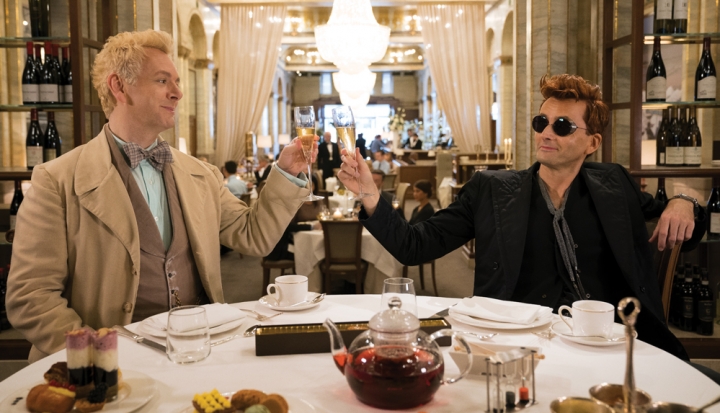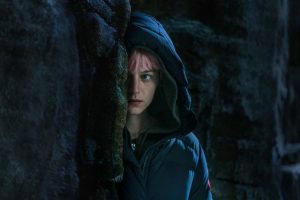A demon and an angel, sitting on a park bench, commiserate about imminent Armageddon and agree: The loss of excellent bookshops, neighborhood cafes where they know you, and Mozart is too much for the divine, who have been visiting Earth and working at cross-purposes since the beginning, to bear.
They vow to collude to thwart the end of days. The thing is, heaven and hell are eager to clash swords and are not concerned about trashing the Earth as collateral damage. Can the ultimate fight between the mighty armies of good and evil be sabotaged by a single demon, Crowley, and one lone angel, Aziraphale?
Most media tales drawn from Revelation are dark and violent. This one is smart, sharp, and witty. It also celebrates humanity and what humans have made of the Earth. It suggests that our paradoxical natures may have been infused from above, where there is someone who rather enjoys these qualities.
Good Omens, a coproduction of Amazon Studios and BBC Studios, is a six-episode Amazon Prime series based on the 1990 novel Good Omens: The Nice and Accurate Prophecies of Agnes Nutter, Witch, by Terry Pratchett and Neil Gaiman.
Agnes, the last of the Salem witches to be burned, penned spot-on prophecies for her descendants, guiding them to buy stock in Apple. The descendants of Agnes and the man who burned her create an echo of the Crowley-Aziraphale relationship and underscore the message that the lines between good and evil are arbitrarily drawn and depend utterly on perspective.
The casting is superb. David Tennant (Crowley) is a strutting, preening, utterly charming demon who rockets around London in a vintage Bentley streaming Queen anthems out the windows. Crowley changes hair color and style by the minute and wears a collection of sunglasses—to hide his demon eyes—that rivals Elton John’s. “I didn’t mean to fall,” he says. “I just hung around the wrong people.” Michael Sheen (Aziraphale) is a sweet-natured, well-read angel who runs a used bookstore and delights in sushi, hot cocoa, and excellent tailoring. Jon Hamm plays archangel Gabriel as a slick, bit-of-a-jerk boss. Frances McDormand is the voice of God. Miranda Richardson (Madame Tracy) is a fallen woman who holds the key to certain characters’ redemption. Douglas Mackinnon (Doctor Jekyll, Doctor Who, one episode of Sherlock) directs all six episodes.
Fans of the novel will recognize the witty names and asides, and theologians have blogged for two decades on the clever inclusions and adaptations of bits of Judeo-Christian lore. It’s worth restreaming a time or two just to catch all the pop culture and religious references. There are also Easter eggs in here for diehards. (That’s Terry Pratchett’s hat and coat hanging in Aziraphale’s bookshop.)
Rigid boundaries between what is right and what is wrong are exposed as permeable and punctured. Heaven has “back channels” through which communication to hell flows, and some archangels have Satan on speed dial. Shakespeare would have felt right at home with these messy nondichotomies.
The series generally navigates the tricky terrain of humor and heresy with humanity and a good heart but strikes a false note in a scene of Golgatha. There is a revealing and touching moment when Crowley appears at Aziraphale’s side, witnessing events. Nodding toward the cross, Crowley wonders, “What was it that he said that got everyone so upset?” Aziraphale answers sadly: “ ‘Be kind to each other.’ ” Crowley nods in understanding. “Oh, yeah, that’ll do it.”
However, in that same scene the violence is depicted in a jarring, almost cartoonish manner. It would have been better to avoid depicting those moments altogether and to leave it at the bittersweet conversation between the two beings. It’s the one false note in an otherwise excellent series.
When Crowley and Aziraphale are on-screen together, it’s impossible to take your eyes off of them. Why angels would possess or even require a gender is as silly a debate as how many of them fit on the end of a pin, but here, where both are played by men, there is a delicious playfulness around issues of gender and sexuality. What is not played at and is much more heartfelt is the growing certainty that these two beings feel a great and binding love not just for humanity and the Earth but also for each other. It’s a love story between good and evil. These are Emmy-worthy performances, executed with intelligence, wit, and great humanity. And there’s the point.
It is intriguing to wrestle with the idea that the flaws of mortals might have been built right into us—out of love. Author and playwright Robert Ardrey did this when he wrote, “But we were born of risen apes, not fallen angels. . . . The miracle of man is not how far he has sunk but how magnificently he has risen.”
Good Omens addresses, with Gaiman and Pratchett’s signature slyness and sarcasm, just why humans are so darn flawed and contradictory. Here, angels and demons—just like humans—are fraught with unpredictable characteristics and refuse to be pigeonholed, even though they obviously once had been in a fallen-from-grace fashion. Distinctions between good and evil are shadowed and elusive. Could it be that humans are lovable even with all our faults? Could it be that we are lovable because of them?
This article also appears in the September 2019 issue of U.S. Catholic (Vol. 84, No. 9, pages 38–39).
Image: Amazon














Add comment